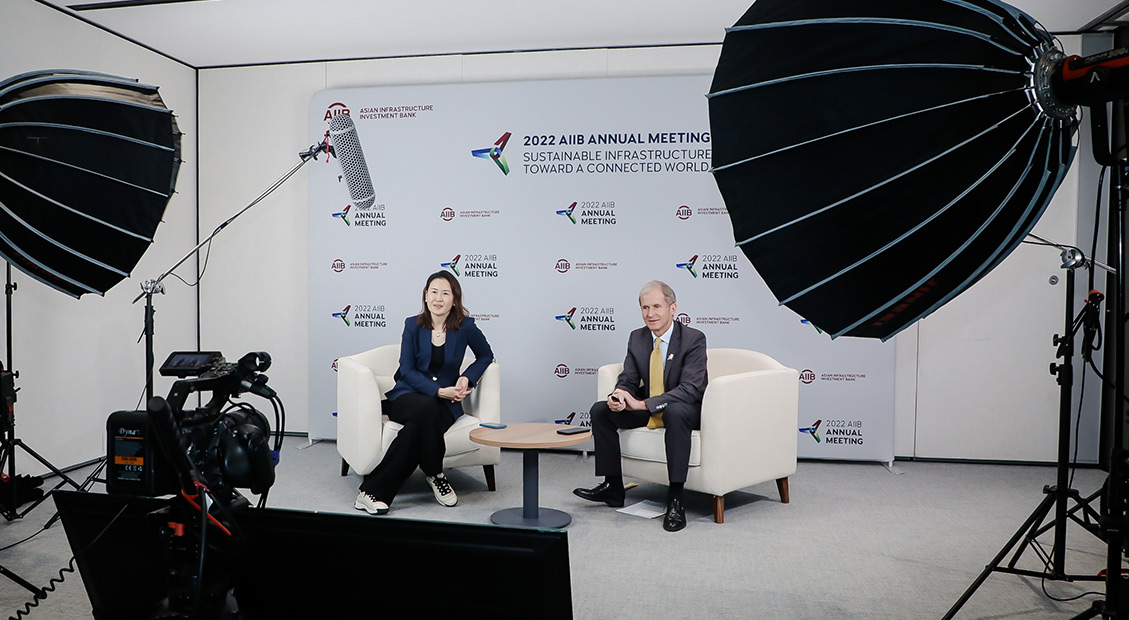As it is, the world is far behind in its commitment to achieving net-zero by transitioning from fossil fuel to other forms of clean energy sources. It is now incumbent upon all decision makers—from governments in all economies, private institutions, to multilateral development banks (MDB)—to take drastic actions in stemming the effects of climate change especially, for people in emerging and developing countries.
What the world needs is a “moonshot.”
This was the scenario set by Erik Berglof, Chief Economist of the Asian Infrastructure Investment Bank (AIIB) as he delivered the Asian Infrastructure Finance 2022 report, “Moonshots for the Emerging World: Transforming State Capacity and Mobilizing Private Sector Toward Net Zero” at the 2022 AIIB Annual Meeting of the Board of Governors.
The AIIB report comes at the heels of the United Nations’ latest report stating that efforts to curb greenhouse gas emissions remain insufficient and that governments must ramp up their climate action plans globally.
The “moonshots” detailed in the report outline what governments, particularly those in emerging economies, can do to begin their transition from fossil fuels to less carbon-emitting energy sources. A key highlight in the report is for state-owned institutions and state-owned enterprises to begin adopting green measures such as phasing out dependence on fossil fuels. They also need to focus more on providing support for national environment sustainability projects.
The report also pushed for state-owned financial institutions—that is, central banks and national banks—to realign funds and investments in fossil fuel projects and invest more in clean energy production programs.
In addition, private sector participation must also share in committing to net-zero by implementing green programs in the value chain—from acquiring their energy needs to delivering their services.
“State-owned commercial banks, national development banks, sovereign wealth funds and central banks must come together and help drive the net-zero transition” Berglof said. “We must also mobilize private capital into the net-zero process and these state-owned institutions must partner with the private sector.”
Behavioral changes in a population are also a necessary step as people in households and businesses must take some level of responsibility to produce positive results. But to a larger extent, these changes must first be met by actions taken by governments and large private institutions that are involved in industries that produce greenhouse gases.
Professor Diane Coyle from the Bennett Institute of Public Policy at the University of Cambridge said that without immediate actions (such as investments in changing to a different energy system or transport system) the risks posed by climate change would affect financial markets as well.
For her, the sooner the changes happen, the better the chances of seeing investments in net-zero projects being realized. The recent launch of and conversation around the AIIB Asian Infrastructure Finance “moonshot” report should jumpstart immediate conversations.
“We should take this opportunity to transition to a system that will save trillions of dollars but will reduce CO2 emissions,” Coyle said. “We can’t achieve system changes by relying on individual incentives. The role of states is coordinating with each other and aligning all the private sector investors and individual behaviors changes that will be needed.”
Jonathan Coppel, head of the Energy Investment Unit of the International Energy Agency (IEA), noted that climate policy goals may be behind in terms of absolute outcomes. He added, however, that there is an increasing level of interest and anticipated investments in the clean and affordable energy sector.
Citing the IEA’s 2021 World Energy Outlook, Coppel said that investments in energy transitions could hit around USD1.4 trillion in 2022, which is 10 percent higher than in previous year.
But Coppel acknowledges that the “moonshots” for emerging markets can be more realistic provided that there is a renewed international effort to step up climate financing. He added that various economy-wide risks among emerging countries need to be tackled at the onset to help allay investors’ fear in taking some of the opportunities in the clean energy field.
“The necessary condition to get us back on track on the net-zero scenario is a massive surge in investments in renewable energy efficiency and other technologies. It is here that needs to occur the reduction and removal for new oil and gas field development. What to do is the easy question but how to do it is the harder question,” Coppel said.
The “moonshot” approaches outlined in the AIIB report largely points to the need for emerging countries to take action in achieving net-zero. But the other side of the issue is the perceived “delayed actions” by more developed nations, who have been identified as those that have produced more carbon emissions.
Suman Bery, vice chairperson of Indian think tank NITI Aayog, said that both rich and emerging nations must come to an understanding on what is fair and realistic, given the individual challenges of all nations and their capacity to respond. He stressed that countries that are more capable to respond can share those experiences and aid emerging nations to make real commitments.
“We would like more demonstration of commitment from countries that have the means, to move faster. A certain amount of learning by what I call ‘crossing the river by feeling the stone’ may be a better model than a state-led moonshot because those can expose societies to unreasonable risks,” Bery said.
The question on how emerging and developing countries should proceed with their programs is something that Berglof said requires even closer collaboration between different countries.
But while he acknowledges as fair that rich countries should take bigger risks, he also stressed that emerging countries still need to determine the best course of action depending on their own local needs. He added that “moonshots” are meant to signal to each government to set their own course.
“Having this ambition to be part of this—but doing it in a way that reflects the local condition—is the best way to proceed,” Berglof said.
Watch the session replay on AIIB’s YouTube channel. The full report can be downloaded from the AIIB website.


